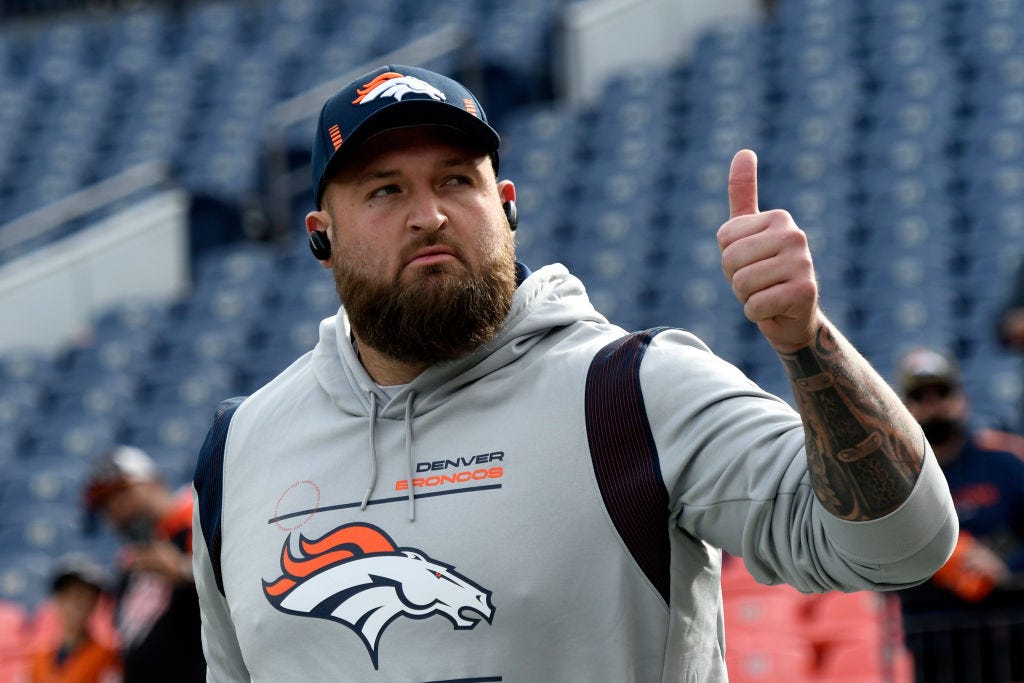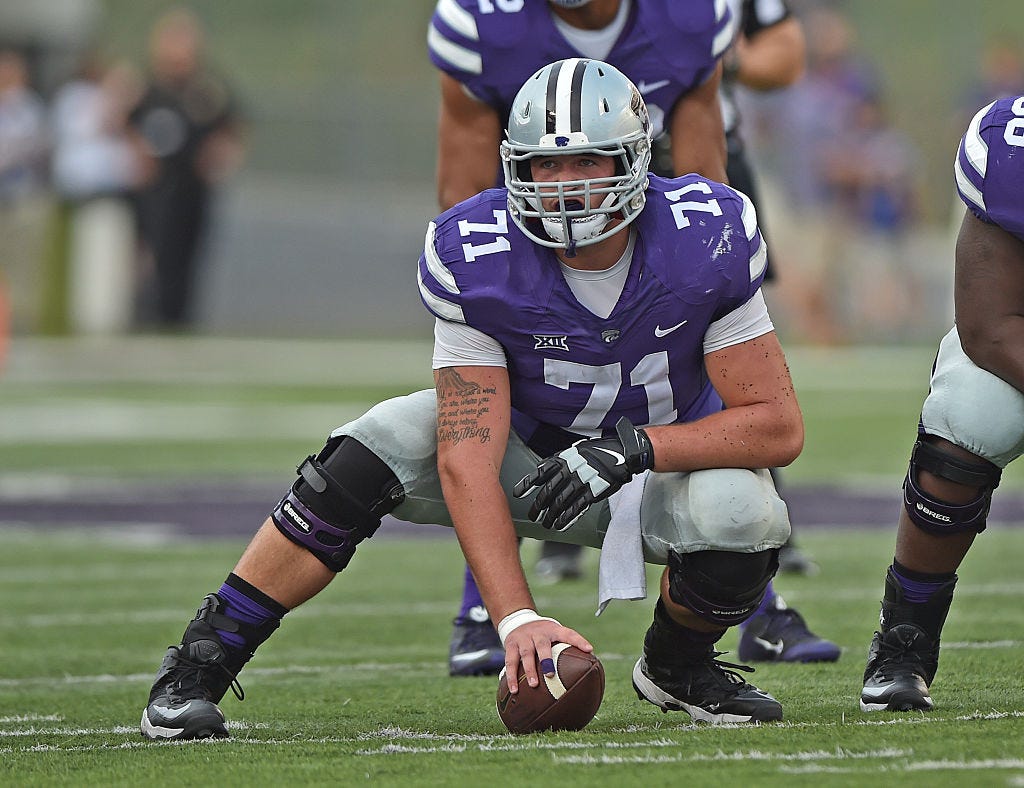Quick Thoughts on the Dalton Risner Signing
The Vikings signed Dalton Risner. I'm not sure what the plan is.
Ian Rapaport of the NFL Network announced that the Vikings signed guard Dalton Risner. Rapaport later tweeted out that Risner would end up receiving a one-year deal for $4 million.
This is a far cry from Risner’s projected contracts we saw in March for Risner; Pro Football Focus projected a four-year deal worth $8.25 million a year while Spotrac projected a four-year deal worth $9.5 million a year.
Either way, a player with his experience, age and production was likely to get much more than what he ultimately ended up with.
Risner caught the attention of Vikings fans after it was announced that he had visited the team and left without a deal. Given the state of the Vikings offensive line – currently graded 20th in the NFL along the interior – and the historical struggles the team has had putting together a competent unit together, fans were enthusiastic about the ability to sign a potential upgrade.
The reason Risner drew so much attention – and earned a high projection from multiple contract projection analysts – is because he played well last year for the Broncos which reflects a history of play over his four years there.
Dalton Risner Profile
The system Risner is from is one that emphasizes zone-style running, in much the same way that the Vikings do. Risner, who played center and tackle for Kansas State in college, was also a good athlete. Though his 40-yard dash time (5.30 seconds) doesn’t move the needle, his performance in the short shuttle (4.52 seconds) was stunning and it maps on much more to how tackles play and what historically has correlated with strong play at the position.
He exceeded position averages for his size in the short shuttle by 0.24 seconds, the three-cone by 0.11 seconds and the broad jump by 8.9 inches. And his athleticism showed up on the field in a pretty significant way for both Kansas State and the Denver Broncos.
With that movement capability, 34-inch arms and an 81 1/8-inch wingspan, there was a belief that Risner could play any position along the offensive line. For the Broncos, it was guard.
Immediately winning the starting guard job as a second-round rookie isn’t surprising, but it would have been shocking if he won that job and kept it for four years if he persistently underperformed. The Broncos kept investing in interior line depth over those years, drafting Netane Muti and Lloyd Cushenberry III in 2020, Quinn Meinerz in 2021 and Luke Wattenberg in 2022.
In 2020, they let Connor McGovern walk in free agency and were also comfortable letting Elijah Wilkinson test the market in 2021. In short, they had options to replace Risner if he wasn’t performing up to standards and they didn’t do it.
As PFF put it in their free agency guide:
Risner offered consistency along a Broncos offensive line that had anything but at every other position, logging almost 1,000 snaps before unfortunately missing the season finale with an elbow injury. Before going down, Risner earned his second consecutive pass-blocking grade above 70.0, with a 65.7 pass-blocking grade on true pass sets that ranked 22nd among guards. It's a great time for Risner to hit free agency, with a short list of quality interior offensive linemen available. Risner is right at the top of that list.
With all that in mind – knowing the Broncos had more interior offensive line options than most teams and that outside ratings agencies considered Risner to be a fairly adequate guard – Sports Info Solutions doesn’t use any PFF data or grades and independently graded him as an above-average guard – why the limited market and cheap deal?
Dalton Risner’s Market Sent Confusing Signals
The Vikings were not alone in needing offensive line help this offseason, but Risner remained on the sidelines for two weeks before a team signed him. And the eventual deal was only for one year and for half of what the contract projections suggested.
It’s difficult to fully square this circle, but it is probably the case that Risner is not as good as his grades would suggest. At the same time, he’s likely a good deal better than the typical street free agent. It may be the case that he held a hard line on a number and teams would refuse to meet it, leading to a dwindling market and a difficult case to make for the remaining teams looking for a guard.
But it’s probably foolish to believe that “it can’t get worse” at guard. It absolutely can. Not only have the Vikings fielded worse guards in the recent past, the guard depth across the NFL is tremendously poor. There’s always one more pressure or TFL an unequipped lineman could give up.
Though guard is a thin position across the league, the free agency market for guards was not. In 2023, we saw Ben Powers – who replaced Risner in Denver – Nate Davis, Isaac Seumalo, Connor McGovern (a different one) and Nate Herbig all switch teams in free agency. Not only that, Will Hernandez didn’t re-sign with the Cardinals until free agency opened.
It may very well be the case that Risner overestimated his free agency pull and priced himself out of the market. If that’s the case, then the Vikings got a very good deal.
The Vikings Haven’t Defined Dalton Risner’s Role Yet
How the Vikings intend to use him is an interesting question, though. ESPN’s Kevin Seifert said he doubted that the Vikings were bringing him in as a backup. Unless Garrett Bradbury’s injury is worse than expected, that would mean that Risner is outright replacing a confirmed starter – Ezra Cleveland or Ed Ingram.
Both have had their issues, but by my eye – and the eyes of PFF – Ingram has been far worse between the two of them. The fact that Risner played left guard instead of right guard for the Broncos shouldn’t be much of a factor; he played right tackle in college and knows right-sided footwork.
Still, it would be surprising. There aren’t many cases of a rookie offensive lineman starting their first year in the NFL, benched in their second year and then becoming a starter again later in their career. If this is what the Vikings are doing, they might as well be giving up on Ingram long-term, even if they say otherwise.
If that’s the case, then the Vikings’ decision to let Risner walk out of the building during training camp despite thinking of him as a starting-quality offensive lineman is a bizarre one. Surely Ingram could have used the competition. It may be the case that Risner’s asking price was too high then and dropped after that, but it’s not as if they lost his phone number between then and now.
He may also not be given the starting job, at least not at first. Risner has tackle capability and may be depth for Christian Darrisaw after Oli Udoh suffered a season-ending injury against the Eagles. Or it could be the case that the Vikings are willing to move Blake Brandel back to tackle and have Risner play as guard depth.
Or, he could play center.
It’s hard to view this signing outside of the lens of the Udoh injury and the lingering concerns over Bradbury. They also may not be optimistic about Chris Reed’s recovery from injury.
Risner may be signed for a starting job, but there are one-year, $4 million guards who aren’t starting in the NFL – Herbig and Ryan Bates are just two examples.
It’s not easy to learn an NFL offense and often offensive linemen are tasked with some mentally difficult stuff. Chemistry along the line is real, too, and figuring out how to pass defensive linemen off in pass protection or work off of double-teams in run blocking takes time.
Having someone like Risner in earlier in camp would have given the offensive line much-needed time to learn to gel together, even if they traded off snaps as part of a rotation. If they needed to sign Risner it’s certainly better that they do so now rather than not at all, but it does make one wonder if they overestimated their ability to evaluate their own linemen.






It's a weird signing in part because it seems almost impossible for them (Vikings management) to come out looking good in the end. If he takes over a starting guard position and plays well, why didn't they sign him earlier? If he starts but sucks, it was a pointless, indeed damaging/financially wasteful, move. Even if he is used mainly as depth and does so capably, we'd all likely say there were cheaper options.